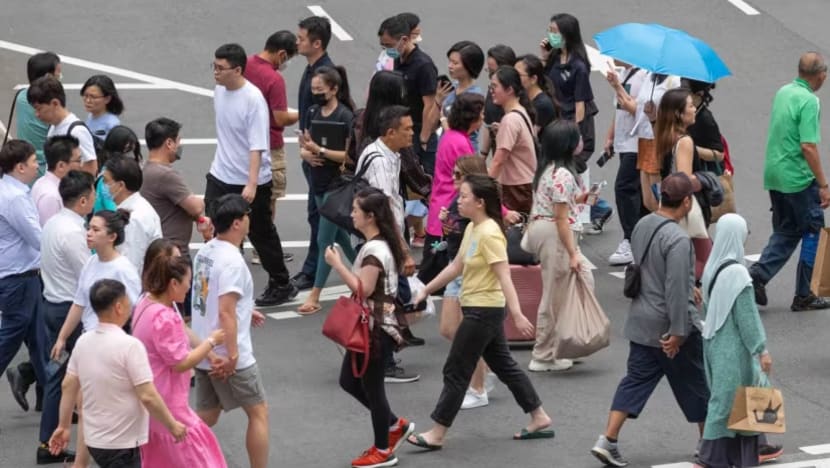Commentary: In the happiness debate, sometimes the middle ground is where life feels fullest
As Singapore clinches the title of the happiest nation in Asia for the second year running, some have questioned the true state of happiness among its residents. Tan Chin Hock, author and founder of Holdinghands Studio, weighs in on what it takes to be truly happy.

File photo of people in Singapore crossing a street. (Photo: TODAY)

This audio is AI-generated.
SINGAPORE: Singapore has been named the happiest nation in Asia for the second year in a row by the annual World Happiness Report. And yet, it seems, some Singaporeans are not happy about being named as happiest.
While some celebrated the recognition, others poured scorn on the survey, pointing out that Singapore also fell five spots to 30th globally, ranking behind Kosovo. They argued that Singaporeans face various stressors in their lives, including a rising cost of living, high housing prices, declining mental health and work-life balance.
Additionally, Singaporeans aged under 30 were also found to be less happy than their elderly counterparts aged 60 and above, prompting a reflection on factors contributing to happiness across different age groups.
Take for example the viral post this month of a junior employee’s struggle with the standard 44-hour work week. His complaints resonated with many who shared similar experiences of adjusting to the demands of adulthood and the workforce, reported TODAY.
In a fast-paced world where a 40ish-hour work week is considered the norm, it's easy to fall into the rhythm of “work, sleep, repeat”. This narrative isn't unique to Singapore: According to a 2023 report by the International Labour Organization, globally, over one-third of all workers are regularly working more than 48 hours per week.
During my 20s and early 30s, I too was caught in this cycle. The monotonous routine of work and sleep led me to wonder if there was more to life than a desk job, a monthly pay check and fleeting weekends. These questions were not rooted in dissatisfaction but in a genuine quest for meaning beyond the conventional measures of success.
WHAT IS LIFE’S PURPOSE?
The question of life's purpose isn't new. Philosophers, poets, and thinkers have grappled with this question for centuries.
In our modern world, no thanks to social media, there's a pervasive belief that everyone has a perfect, successful life, fully aware of their direction in life. But how often are carefully curated social media posts a reflection of the truth? How do societal pressures shape individual perceptions of happiness and purpose?
Consider the parents juggling diaper changes and 2am feeds, along with babies with severe allergies, who would give almost anything for a couple of hours of undisturbed sleep. Then there’s the childless couple who would do anything for the sound of a baby in their home.
Consider too the office worker staring out the window, daydreaming of starting their own business, not seeing the sleepless nights the small business owner spends crunching numbers and fretting over loans.
This all to say that there are potholes in everyone’s road in life. If we all tossed our problems into a pile and saw what others deal with, I suspect we’d be quick to grab ours back.
PURPOSE IS A JOURNEY, NOT A DESTINATION
We often hear of the phrase "life is about the journey, not the destination". Similarly, purpose is not a distant destination; it’s the culmination of daily choices and actions.
There’s a well-known story from late US president John F Kennedy’s visit to NASA in 1962. During his tour of the facility, he met a janitor and asked him what he did for NASA. The janitor replied: “I’m helping to put a man on the moon”.
Similarly, a security guard at a school can see themselves not merely as gatekeepers, but as guardians of the students and staff. Likewise, no matter how large or small one’s role is, each of us contributes to the broader mission in our surroundings.
Fulfilment doesn’t always come from being at the top of the class, driving the fanciest car, or living in a mansion. Sometimes, the middle ground is where life feels fullest.
Life isn’t a race to see who gets the furthest the fastest. What's important is the journey - exploring, discovering, and embracing what truly matters with the people who cheer you on. Sure, challenges and sacrifices are inevitable during this journey, but the true test comes not from avoiding these obstacles but from facing them head-on, learning, and evolving along the way.
WHERE DOES THE JOURNEY BEGIN?
So where do you start? Begin by questioning the “whys” of your life. Why do you work the job you do? Is it for passion, security or prestige? Why do you chase the goals you've set? Are they truly yours, or imposed by society or family? It's okay not to have all the answers immediately. The key is to start asking these questions, to initiate the process of self-reflection.
The next step is to gradually align your actions with your newfound insights. Maybe it's changing careers, starting a new hobby, or simply spending more time with loved ones. The shifts don't have to be monumental; even small changes can lead to significant transformations in how you feel and perceive your world.
Take my experience, for instance. As a fitness enthusiast looking to impact more lives, I completed a certification course in 2009 to become a fitness instructor and worked part-time in public gyms. However, after more than a year, I realised that path wasn’t the right fit for me. Had I not done so, however, I would never have known either way.
Finding purpose is not an overnight achievement. It's a lifelong quest, filled with trials and errors, joys and sorrows. And while the societal benchmarks of success - the promotions, the accolades, the material possessions - can offer temporary satisfaction, they're not the ultimate indicators of a purposeful life.
Consider Bill Gates’ insights: “Money has no utility to me beyond a certain point. Its utility is entirely in building an organisation and getting resources out to the poorest in the world.”
Of course, your purpose need not entail solving world problems. However, being average doesn't limit your capacity to make significant contributions. It might be as simple as being the best parent you can be, spreading kindness in your community, or bringing laughter to your friends.
It's about waking up each morning with a sense of gratitude and going to bed each night with a feeling of accomplishment, no matter how small.
In embracing your average, you might just find your extraordinary.
Tan Chin Hock is the author of It’s Ok To Be Average: You Can Still Lead A Purposeful Life and the founder of social enterprise Holdinghands Studio.

















